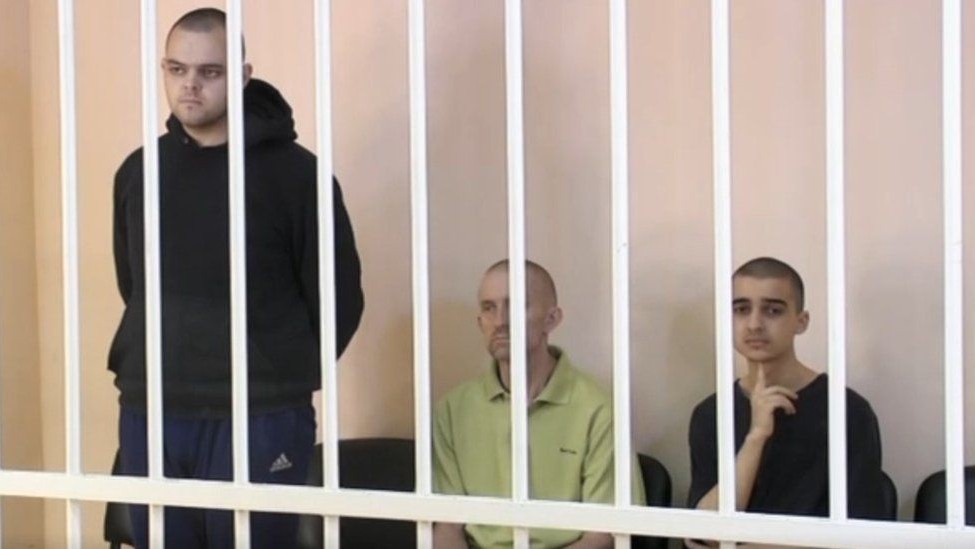Why two Britons were sentenced to death in Ukraine
Aiden Aslin and Shaun Pinner face death penalty after their conviction in a breakaway court

A free daily email with the biggest news stories of the day – and the best features from TheWeek.com
You are now subscribed
Your newsletter sign-up was successful
Foreign Secretary Liz Truss will speak with her Ukrainian counterpart about two Britons handed death sentences yesterday by a Russian proxy court in eastern Ukraine.
Aiden Aslin, 28, and Shaun Pinner, 48, who were accused of terrorism, face a firing squad after they were found guilty of “mercenary activities and committing actions aimed at seizing power and overthrowing the constitutional order of the DPR [Donetsk People’s Republic]”. The British government said the sentences breach the Geneva Convention.
Truss has described the verdict as a “sham judgment” and said it had “absolutely no legitimacy”, said The Guardian.
The Week
Escape your echo chamber. Get the facts behind the news, plus analysis from multiple perspectives.

Sign up for The Week's Free Newsletters
From our morning news briefing to a weekly Good News Newsletter, get the best of The Week delivered directly to your inbox.
From our morning news briefing to a weekly Good News Newsletter, get the best of The Week delivered directly to your inbox.
How did they come to be in Ukraine?
Pinner has lived in the country since 2018 and has a Ukrainian wife. In April he said that he had been captured while defending Mariupol, his adopted city. His family stressed at the time that he was “not a volunteer nor a mercenary, but officially serving with the Ukrainian army”.
He had previously told Sky News that he was on his fourth tour of duty in Ukraine after serving in the British Army for nine years.
Aslin, a former care home worker who has a Ukrainian fiancée, joined Ukraine’s armed forces as a marine in 2018 and has applied for citizenship.
‘Nuremberg 2.0’
The BBC said that although the two men were accused of being mercenaries, Aslin and Pinner insisted they should be treated as prisoners of war.
A free daily email with the biggest news stories of the day – and the best features from TheWeek.com
The court which pronounced the death penalty is not recognised internationally because it is held in the breakaway state, set up by Russian separatists in 2014, which Russia is the only member of the UN to recognise.
State media in Russia has accused the West of sending mercenaries to fight in Ukraine, so the high-profile trial of foreign fighters may have been regarded as a “valuable propaganda tool”, said The Telegraph.
Russian officials had previously threatened to hold military tribunals they have called “Nuremberg 2.0”, reported The Guardian. Commentators believe the trials may be used to put pressure on the West and to prompt prisoner exchanges for Russian soldiers captured and tried in Ukraine.
Following the sentencing, Metro described the two men as “Putin's pawns,” reporting that there were fears the men would become “bargaining chips”.
The families of both men have asked the British government to intervene. Asked about the case on LBC yesterday, Justice Secretary Dominic Raab said that although he did not know “all the details, of course we would expect the laws of armed conflict to be respected, and we will make sure that we will make all the representations”.
Chas Newkey-Burden has been part of The Week Digital team for more than a decade and a journalist for 25 years, starting out on the irreverent football weekly 90 Minutes, before moving to lifestyle magazines Loaded and Attitude. He was a columnist for The Big Issue and landed a world exclusive with David Beckham that became the weekly magazine’s bestselling issue. He now writes regularly for The Guardian, The Telegraph, The Independent, Metro, FourFourTwo and the i new site. He is also the author of a number of non-fiction books.
-
 My Father’s Shadow: a ‘magically nimble’ film
My Father’s Shadow: a ‘magically nimble’ filmThe Week Recommends Akinola Davies Jr’s touching and ‘tender’ tale of two brothers in 1990s Nigeria
-
 Send Help: Sam Raimi’s ‘compelling’ plane-crash survival thriller
Send Help: Sam Raimi’s ‘compelling’ plane-crash survival thrillerThe Week Recommends Rachel McAdams stars as an office worker who gets stranded on a desert island with her boss
-
 ‘Longevity fixation syndrome’: the allure of eternal youth
‘Longevity fixation syndrome’: the allure of eternal youthIn The Spotlight Obsession with beating biological clock identified as damaging new addiction
-
 Epstein files topple law CEO, roil UK government
Epstein files topple law CEO, roil UK governmentSpeed Read Peter Mandelson, Britain’s former ambassador to the US, is caught up in the scandal
-
 Iran and US prepare to meet after skirmishes
Iran and US prepare to meet after skirmishesSpeed Read The incident comes amid heightened tensions in the Middle East
-
 Israel retrieves final hostage’s body from Gaza
Israel retrieves final hostage’s body from GazaSpeed Read The 24-year-old police officer was killed during the initial Hamas attack
-
 China’s Xi targets top general in growing purge
China’s Xi targets top general in growing purgeSpeed Read Zhang Youxia is being investigated over ‘grave violations’ of the law
-
 Panama and Canada are negotiating over a crucial copper mine
Panama and Canada are negotiating over a crucial copper mineIn the Spotlight Panama is set to make a final decision on the mine this summer
-
 The rise of the spymaster: a ‘tectonic shift’ in Ukraine’s politics
The rise of the spymaster: a ‘tectonic shift’ in Ukraine’s politicsIn the Spotlight President Zelenskyy’s new chief of staff, former head of military intelligence Kyrylo Budanov, is widely viewed as a potential successor
-
 Why Greenland’s natural resources are nearly impossible to mine
Why Greenland’s natural resources are nearly impossible to mineThe Explainer The country’s natural landscape makes the task extremely difficult
-
 Iran cuts internet as protests escalate
Iran cuts internet as protests escalateSpeed Reada Government buildings across the country have been set on fire